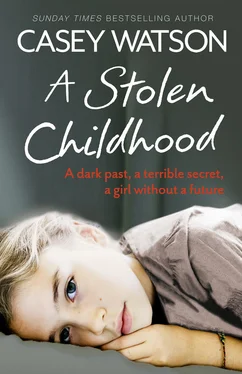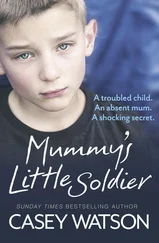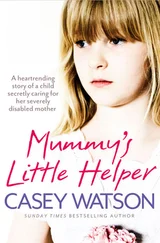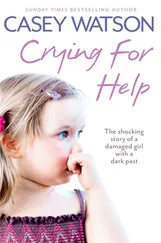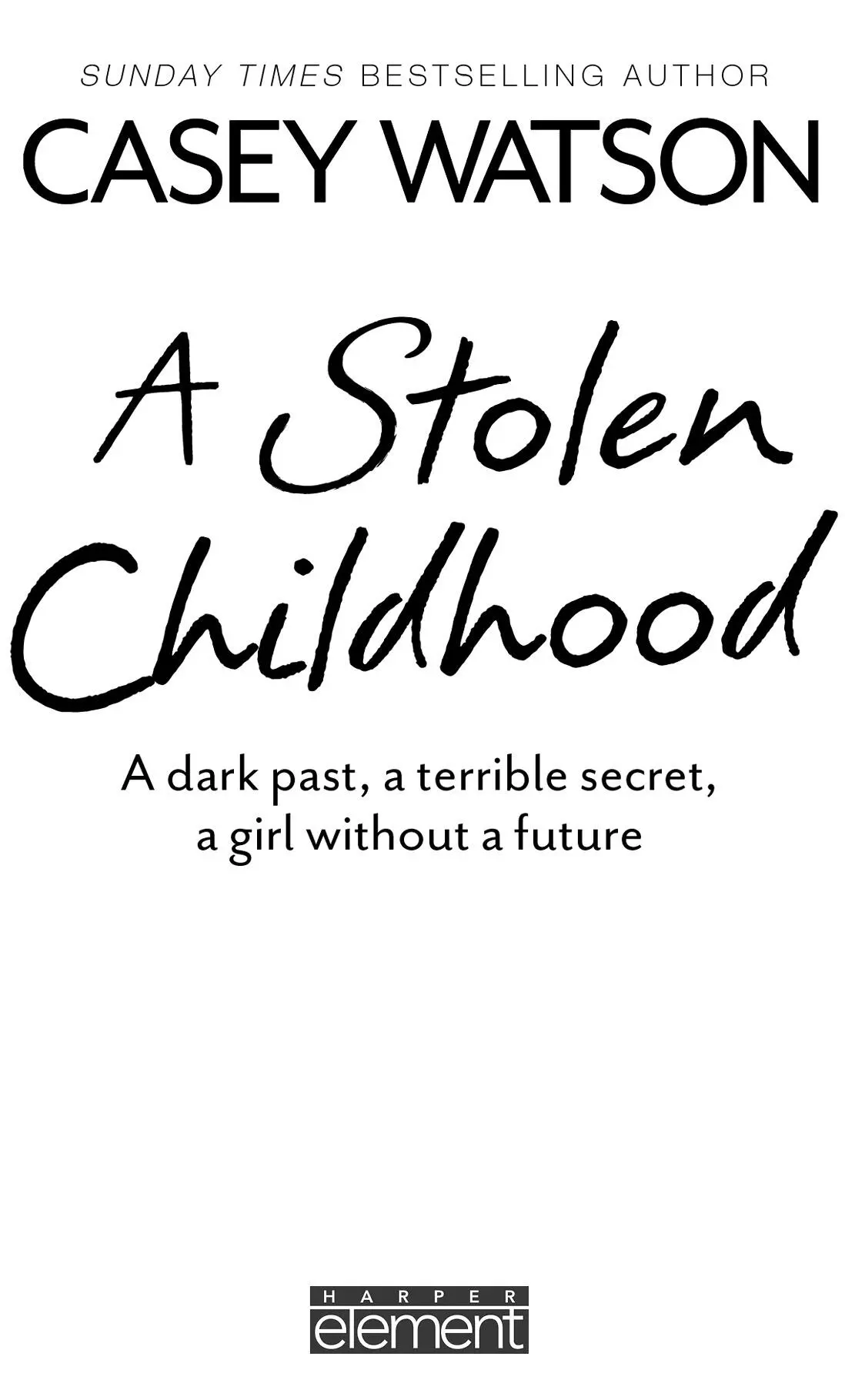
This book is a work of non-fiction based on the author’s experiences. In order to protect privacy, names, identifying characteristics, dialogue and details have been changed or reconstructed.
HarperElement
An imprint of HarperCollins Publishers
1 London Bridge Street
London SE1 9GF
www.harpercollins.co.uk
First published by HarperElement 2015
FIRST EDITION
© Casey Watson 2015
Cover layout design © HarperCollins Publishers Ltd 2015
Cover photograph © Marzena Kosicka/plainpicture (posed by model)
Casey Watson asserts the moral right to
be identified as the author of this work
A catalogue record of this book
is available from the British Library
All rights reserved under International and Pan-American Copyright Conventions. By payment of the required fees, you have been granted the non-exclusive, non-transferable right to access and read the text of this ebook on-screen. No part of this text may be reproduced, transmitted, down-loaded, decompiled, reverse engineered, or stored in or introduced into any information storage and retrieval system, in any form or by any means, whether electronic or mechanical, now known or hereinafter invented, without the express written permission of HarperCollins ebooks.
Find out about HarperCollins and the environment at
www.harpercollins.co.uk/green
Source ISBN: 9780007543090
Ebook Edition © June 2015 ISBN: 9780008118624
Version: 2016-10-19
The Boy No One Loved
Crying for Help
Little Prisoners
Too Hurt to Stay
Mummy’s Little Helper
Just a Boy (short story)
Breaking the Silence
A Last Kiss for Mummy
Scarlett’s Secret (short story)
The Girl Without a Voice
Nowhere to Go
No Place for Nathan (short story)
Cover
Title Page
Copyright
By the Same Author
Dedication
Acknowledgements
Chapter 1
Chapter 2
Chapter 3
Chapter 4
Chapter 5
Chapter 6
Chapter 7
Chapter 8
Chapter 9
Chapter 10
Chapter 11
Chapter 12
Chapter 13
Chapter 14
Chapter 15
Chapter 16
Chapter 17
Chapter 18
Chapter 19
Chapter 20
Epilogue
If you like this, you’ll love …
Casey Watson
Moving Memoirs eNewsletter
Write for Us
About the Publisher
Some wise person, somewhere, coined the phrase, ‘It’s the little things,’ and you know, it really is. This book is dedicated to all those who do the little things without thinking, every working day. The dinner ladies, the playground assistants, the volunteer mentors and the teachers, the classroom assistants, the school nurses, the year heads and the support staff. These people, in their dedicated roles and in the busy school environment, often have no idea what a positive effect they have on their students. Continue doing what you do, and know that every little smile you give, every pat on the back, every wink or nod in the corridor, really makes somebody’s day. I raise a glass to all of you.
I would like to thank my agent, the lovely Andrew Lownie, for continuing to believe in me; Carolyn and the wonderful team at HarperCollins for their dedicated and hard work; and as ever my very talented friend and mentor, Lynne, for always being there.
What Lies Beneath . That was the name of the film, wasn’t it? The one where the wife thinks she’s seeing things that aren’t there? As titles went, it was a good one for a psychological thriller. But though it would soon strike a chilling chord with me for professional reasons, right now I was oblivious of what lay in store, so it came to mind for more practical ones. I was busy digging – digging deep into my capacious school satchel, to see if what lay beneath in this case was a pen that actually worked.
It was touch and go whether I’d have any success. In fact, it was an action that, at times, put me in mind of one of those celebrities in the jungle plunging a hand into a black hole while being blindfold. It was a very big satchel and there was a great deal of stuff generally at the bottom of it, which was par for the course given the nature of my job. ‘You know what?’ I said to Kelly, my sometime assistant, having turfed out half the contents in order to find one, ‘you would think that after all this time, someone would finally work out how to operate the heating system in this place, wouldn’t you? It’s not exactly rocket science, after all.’
It was mid-morning break and Kelly and I, along with a lot of the other teaching staff, were spending it in the staff-room – not just so we could warm ourselves up a bit with hot drinks, but so we could retrieve any extra clothing we might have in our lockers.
It was only the beginning of March, but it was almost as if all the radiators in the place somehow knew that the weathermen had announced that morning that it was officially the first day of spring. They had then apparently decided in unison that they should break down, quite possibly for the entire season. This in turn meant that the school was already going into the usual ‘cold weather meltdown’, with key staff bustling about the place bearing thermometers and recording temperatures, while the children – always quick to sniff an opportunity on the breeze, particularly a chilly one – could already be heard up and down the corridors making plans for a possible early exit, if there were insufficient degrees Celsius for them to be allowed to stay.
‘It’s not boiler science either,’ Kelly told me. ‘Not on this occasion, anyway. I just saw Donald on the way up here and he said it’s not the boilers. Apparently someone turned the whole system off over the weekend by mistake and it’s just taking a long time to kick in again. Still,’ she said, grabbing a biscuit from the half-opened packet on the table in front of us, ‘didn’t Ranulph Fiennes say that when it’s really cold you burn loads of extra calories through shivering? So that’s fine by me. Custard cream?’
Her enthusiasm for trying to force-feed me biscuits aside, Kelly Vickers was a godsend in my working life. One of the school’s 20 or so teaching assistants, she was assigned, first and foremost, to help me as and when required in my role as the school’s Behaviour Manager. Ours was a busy inner-city comprehensive, big enough to have a specialised behaviour unit (well, to us, just ‘the Unit’) where my job was all about helping the various children who, for one reason or another, couldn’t cope effectively in mainstream classes. It was a veritable ‘mixed bag’ of reasons, as well, including children who were in danger of being excluded, those who had problems in school (be they academic and/or social) and kids who were struggling because of problems at home – something that naturally tended to impact on a child’s progress and well-being.
The diversity of my pupils’ needs meant that no day was ever just like another and, unlike most of the mainstream teachers, who had clear curriculum-based briefs, I couldn’t plan too far ahead because I never knew from one day to the next just who I might have in my classroom.
Today, though, I was completely child-free. ‘Well, I hope they sort it out soon,’ I said, declining the proffered biscuit packet and reaching for my coffee, ‘or we’ll have a hard time engaging our new brood tomorrow, won’t we? I don’t think there’s anything moodier than a kid that’s too hot or too cold.’
Читать дальше
